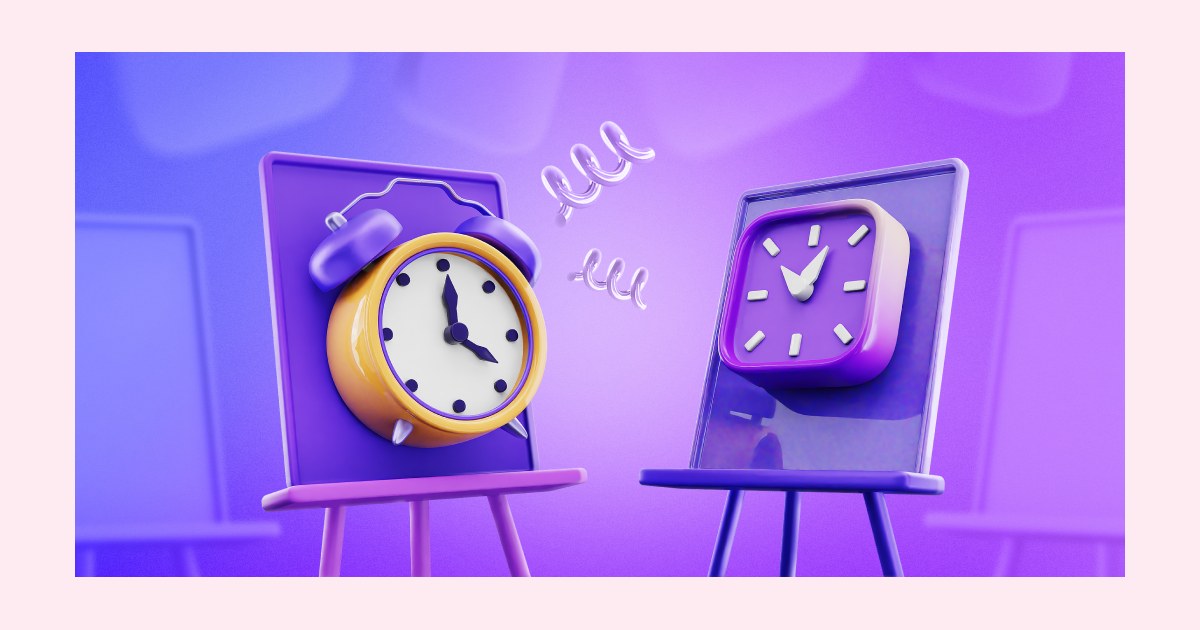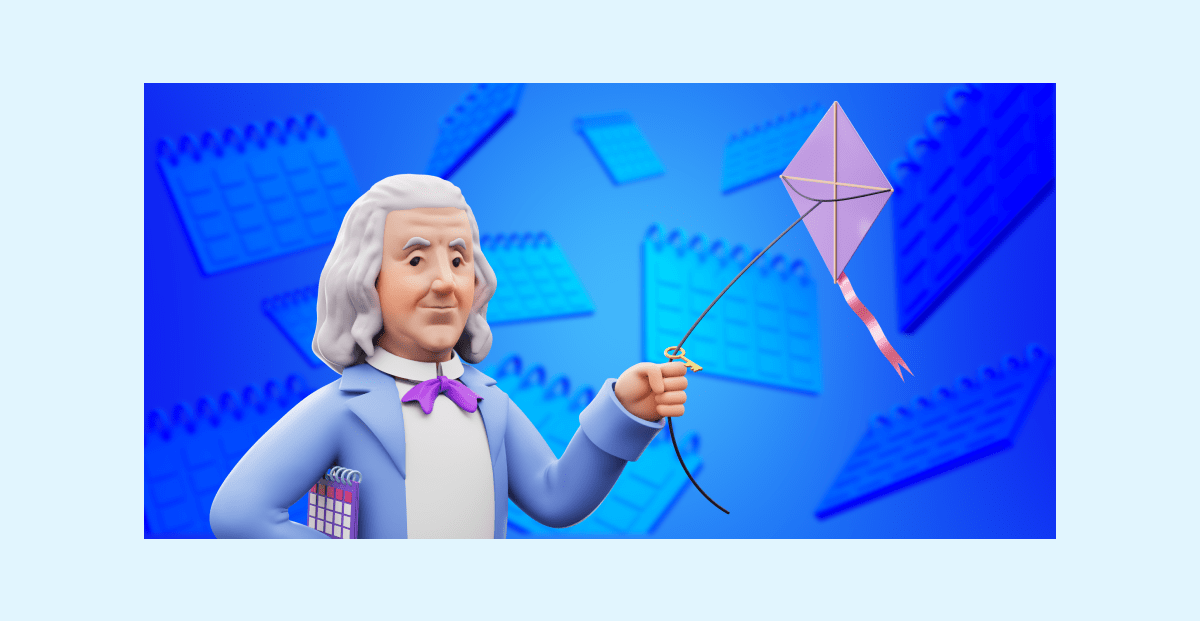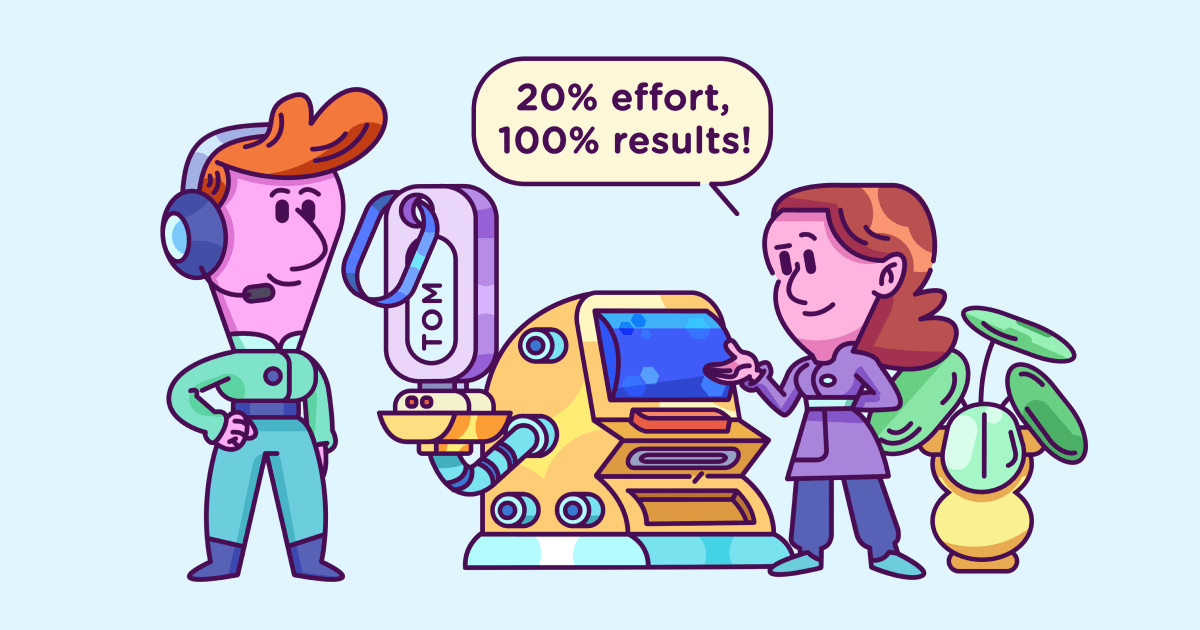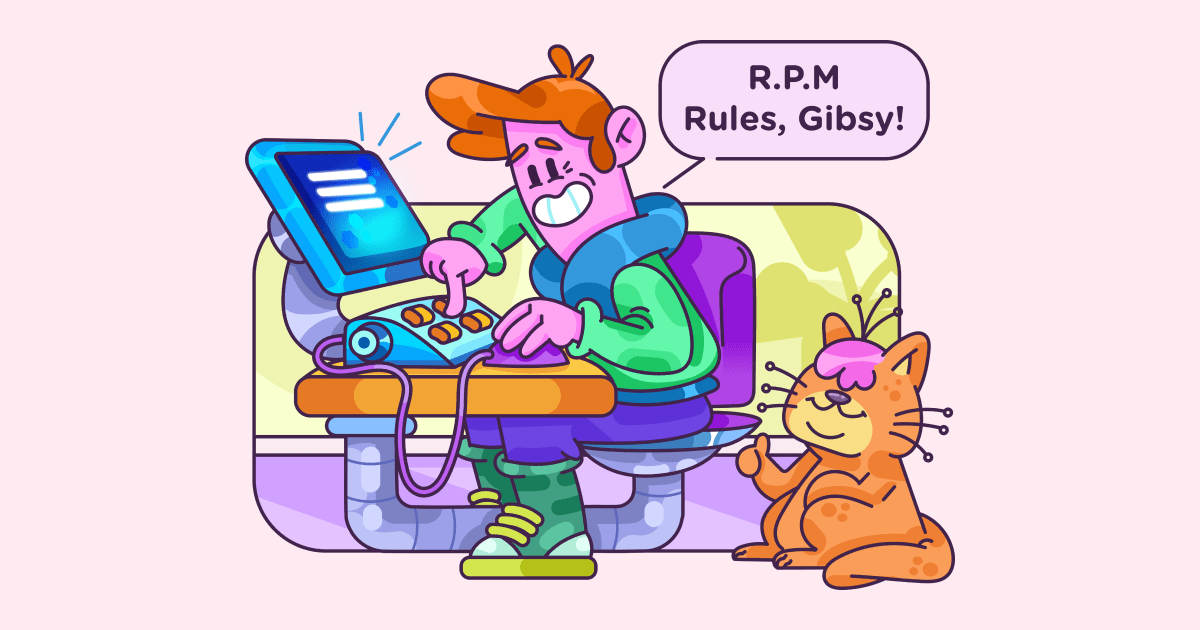Why some people are more productive at night (+ tips for night owls)
Last updated on: May 8, 2023
With the rise of remote work, there’s been a noticeable change in people feeling more productive at night. It’s an interesting phenomenon that involves genes, lifestyle, personality type, and even brain chemistry. Night owls seem to be thriving, and we’re going to delve into the core of their productivity, the biology of their inner clocks, and how one can stay focused and energized when working late.
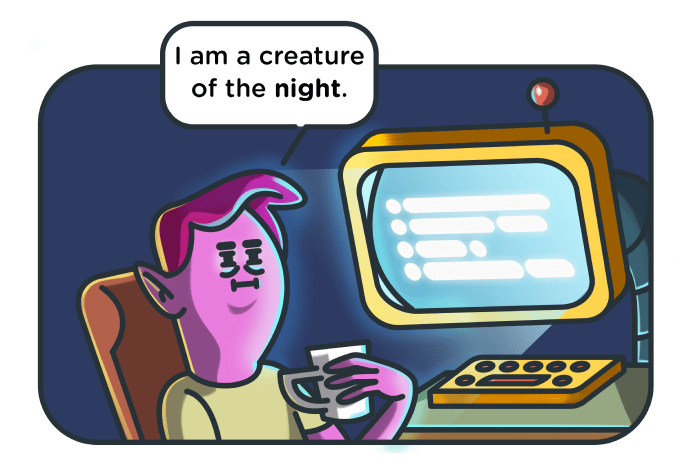
Table of Contents
How night owls work
Night owls are people who find their most productive hours after some people have done their bedtime routines. They can work late into the night, sometimes even until morning. And for such a long time, I couldn’t understand them. I’d be dead-tired by 11 p.m.
But, in researching night owls, so far removed from my own lark-y self, I ran into a captivating article by Kathryn Schulz. One particular part had me smiling, and instantly understanding these strange “night birds”:
“It starts, as I said, around 10 p.m., when something ticks over in my mind, as if someone had walked into a shuttered cabin and flipped all the switches in the fuse box to “on.” For the first time all day, I get interested in writing. As a corollary, I get a lot less interested in everything else.”
It was Schulz and this quote that set me on a path of researching night owls and becoming less misinformed about them. So, one would say this article is mainly a spotlight for them, while giving the rest of us some much-needed slap on the hand for thinking they’re lazy.
Are night people more productive?
Contrary to popular belief, one group isn’t better than the other. The working world is currently better suited for early birds, which is why you hear more about them.
In fact, numerous research on night owls and morning larks (another term for early risers) focuses more on the differences in other aspects of life. To compare them more casually, both groups are like ice cream flavors — vanilla or chocolate. One isn’t inherently better than the other, they’re both sweet, but people will always choose one or the other.
It’s the same with productivity and people’s biological clocks. Both owls and larks are equally productive, just at different times of the day.
Why are some people more productive at night?
Night owls are a mystery that has garnered quite a bit of attention lately. An article by Rachael Rettner is among many who can answer the question of nighttime productivity. She examined several different studies to draw the conclusion that when we are most productive depends on:
- Genetic predisposition;
- Our brain’s “wiring”;
- Circadian rhythm — owls’ and larks’ bodies function on a different wavelength;
- How our lifestyle and circumstances shape our habits.
Let’s take a closer look at each factor and how they come together to form a night owl’s unique work habit.
Genetic predisposition for late-night work
Fairly self-explanatory, if someone in your family is or was a night owl, especially one of your parents, odds are that you will be one as well.
Scientists Satchidananda Panda and Luciano DiTacchio have managed to locate the gene that basically functions as an alarm clock for our bodies. And since they’re part of the genetic material, they can be transferred as easily as eye color from the parents to the child.
Brains that are more functional late in the afternoon
Aside from genetics, neurological studies and imaging have shown over and over again that early birds’ and night owls’ brains just work differently.
Night owls reach their peak in the afternoon and evening, while the larks find that productivity boost earlier in the morning.
Circadian rhythm and metabolism’s role in a night owl’s routine
Circadian rhythm as a word comes from the Latin words “circa” meaning “about”, and “dies” meaning “day”. It is used to describe the way our bodies function through the day: when we wake, go to sleep, eat, when we’re most energetic, etc.
It’s the main way of distinguishing between the night owls, early birds, and — believe it or not — the intermediate type. Science tells us that out of the three types, the vast majority of us actually belong to the last one. Early birds would be considered really early risers (say, between 4 and 6 a.m.), while the night owls would be those going to bed long after midnight. But the extremes are rare, as studies have shown.
How lifestyle and circumstances shape the night owls
Some people become night owls due to some changes in their lives. For example, some parents find themselves more productive only at night because, for a long time, they had to be. Their kids would go to bed at 8 or 9 p.m. and only then was it possible to focus on their own work.
In contrast, my mother, who had three of us, has become a light sleeper and can’t stay in bed past 8 a.m. She even says how having to get up frequently at night, and prepping everyone for school (including herself, as she is a teacher), she got used to being an early bird.
Lastly…. Some people just love the nighttime. There are fewer distractions, everything is silent and more peaceful. Night owls with ADHD have even reported their brains are less stimulated at night, and can actually focus.
It’s worth taking a look at your own lifestyle, family, and living conditions in general, to see just which ones shaped you into the night owl you are today. Maybe therein lies the secret to improving your work habits as one, unlocking their full potential.
Is it okay to be a night owl?
Our personal conclusion? Absolutely.
You can’t go against your genetic makeup, or how your brain is wired.
And as we’ve seen, whether you’re an early bird or a night owl depends largely on those two factors. However, we can’t deny that the world is tailored to early risers. Statistics favor them when it comes to success, even if night owls are seen as more adaptable and creative.
Unfortunately, having a different biorhythm to your peers is still, in a way, stigmatized. Night owls can be seen as lazy, inadaptable (ironically), or simply as victims of bad habits, despite them trying to fit into the conventional workday mold for years.
Till Roenneberg, author of Internal Time: Chronotypes, Social Jet Lag and Why You’re So Tired, put it best:
“Once enlightened, they [night owls] started to understand themselves (and others) much better, began to appreciate their own individual time, and were suddenly relieved of the weight of prejudice ridiculing their temporal habits: for example, being called lazy if you don’t wake up fresh as a daisy by seven o’clock in the morning; or being called a boring person only because you don’t enjoy going out with friends after ten at night.”
This is why it’s crucial for every night owl to establish boundaries with the early birds in their life and at work. The real victory is in overcoming the stigma and downsides that come with it. Namely, how working later at night affects your body and mind in the long term.
Being a night owl comes with health risks
The bad news is: night owls have increased risks of numerous illnesses precisely because they work late. This is mostly due to those who can’t and don’t structure their work, and end up sleeping too much or too little.
Our bodies are designed to follow the sun’s rotation cycle throughout the day. It’s something deeply embedded in our genes, because the daytime is meant for work, hunting, and socializing, while the night is for sleeping. And even though we don’t live in hunter-gatherer societies anymore, it is still evolutionary early for our bodies to catch up to our modern society. In short — we’re modeling life and society faster than biology can keep up.
This is why the human body hasn’t yet fully adapted to the night owl lifestyle. Researchers have found that among those risks, sleep apnea, depression and anxiety, type 2 diabetes, and hypertension are among the worst offenders.
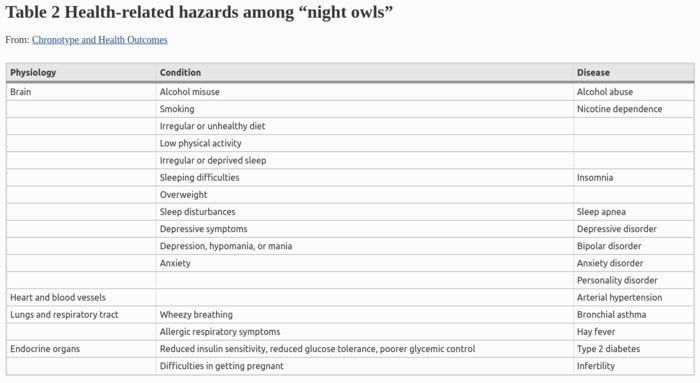
Source: SpringerLink
Though it looks bleak, this is no cause for panic. In fact, this information can help night owls become better at structuring their time and taking care of themselves better. After all, knowing the risks can help you avoid harmful consequences. And in the next part, we’ll be sharing some tips on how to get the most out of late-night work, while staying healthy.
Productivity tips for night owls
“Owls are at best, extroverted artists and intellectuals, or at worst, people who engage in dark arts and exert evil powers”
– T. Roenneberg, Internal Time
Succeeding as a night owl is possible. For freelancers and business owners, that’s not going to be a problem. They make and manage their own schedules. But for knowledge workers, those tied up in crowded offices, and shift workers, it can be a challenge.
Find your most productive time of night
You need structure even if you’re super productive at night. Otherwise, you’ll easily slip into overwork and potentially ruin your sleep schedule. Burnout is a very real thing.
Try timeboxing to introduce some linearity to your workload. Track your time and tasks, just like a morning person would (if you’re not doing so already), as accurate data is your best friend. Soon, you’ll begin to notice what times of evening or night are your best times to focus. Then you can use moments of lower concentration for rest and recharging.
Keep to a consistent sleep schedule
When I shared all the findings about night owl health risks with a couple of friends, I almost got a unanimous and loud: “Sleep is sleep! So long as you get enough hours in, what does it matter when you go to bed?”
Surprisingly enough, for those who agree, it does matter. In the above-mentioned research on health risks in night owls, Timo Partonen noticed that, even if the night owls they tested slept a consistent amount of hours, the risks were still there. The whole problem was the body needing sleep at night.
So, trying to go for a consistent sleep schedule could help immensely. And it doesn’t have to be a huge change. Deciding to go to sleep no later than 1 a.m. or 2 a.m. every night, despite your energy levels or amount of work, is good enough.
Automate your morning tasks
For night owls who need to be at work bright and early, and have no way of avoiding a 9-to-5, try to automate as much of your morning workload as you can. Make an easy-to-follow to-do list of some mundane tasks to do before your brain kicks into gear.
This could be archiving emails or sorting your inbox, doing some digital decluttering, preparing data or research for more demanding tasks later on, etc. Help your brain out by starting slow, and letting it wake up on its own terms.
Ask for a later start
There is no shame in asking your boss for a later start. Many companies allow their employees to get started earlier, so it would only be fair to try and vie for the same treatment.
However, My Hub Intranet statistics suggest that you should articulate it, so your boss doesn’t think you want to be lazy. If possible, you can discuss it first with HR and see if you can find a compromise. Arrangements like these are not unheard of. Organizations like BSociety with its founder, Camilla Kring, fight for the night owls’ place in the workforce, and for companies to hear their needs. Do keep in mind that a lot of companies still depend on synchronous work. So if your peak hours are at 10 p.m. when most of your coworkers are asleep, getting that late a start will be difficult.
Other options would be to work from home a few days a week, if you’re not already, negotiating things like flex time (thanks to labor laws), or a 9-80 work schedule. And if you manage to rally a few more night owl coworkers, odds of success are greater.
Journal your night-time experiences
We’ve mentioned that learning how to manage your night-time energy would greatly help in reducing health risks. This includes spending a few minutes every day (or night), journaling details that affect your routine. These can include:
- Foods that give you more energy, or make you sleepier;
- Noises that help or disturb your concentration;
- Lighting;
- Distractions.
Consolidate the information after a week of tracking. Are there any habits that could help you start work earlier? Which ones leave you groggy after waking up? What does your bedtime routine look like?
In some of those habits lies the answer to shifting your schedule just enough to keep your productivity, while conforming to the daytime work hours.
Manage bedroom lighting
Night owls can be notoriously difficult to get up. They sleep through several alarms and wake up feeling groggy and dysfunctional.
One research included their subjects camping out in the woods without electronic devices and lighting. They noted a whopping 69% shift in circadian timing, meaning that night owls were affected by their environment. Take away indoor lights, phones, computers, and TV screens, and the body clock slowly resets. They felt refreshed and more energized after waking up, even if they weren’t completely morning larks.
To try and emulate this, you can get a sunlight alarm clock. Instead of noises waking you up, it is a lamp that illuminates gradually, based on the actual sun. As a waking method, completely darkening your room and having only a sunlight alarm clock, it achieves better results than a loud noise out of nowhere.
Take extra care of your health
Clinical psychologist Dr. Michael J. Breus wrote for HuffPost about the downsides of being a night owl. While they are more creative, can be productive longer, and generally have more energy, Breus finds they’re also more vulnerable to substance abuse (alcohol, nicotine, medication), poorer diets, and less exercise. All of this is arguably an even bigger factor in the health complications than being a night owl per se. This is why you need to take more care of what you eat and drink, even more than morning larks.
Eat brain-boosting foods, train or start a sports activity, or even just take longer walks every day. Drink enough water and steer clear of alcohol and carbonated drinks, especially in the late-night hours.
Avoid overeating
In the same vein as the previous tip, keep serious late-eating at bay with emergency snacks. I think back to my university days, and how staying up late to study meant getting really hungry around midnight, or 1 a.m. Getting a full meal back then would definitely send me sleeping, or later waking up feeling queasy. Not to mention I packed a few additional pounds.
If you decide to swap meals for snacks, don’t take anything high in carbohydrates and sugars. It may fill you up faster, and more easily, but it will also lead to a sugar crash. This includes processed foods like chips, most candy bars, and energy drinks.
Consider shifting to an intermediate routine
The aim of this article is not to preach how “early bird is the road to take”, but I would be remiss not to mention that shifting your circadian rhythm can actually bring numerous benefits. Dr. Elise Facer-Childs of Monash University in Australia conducted a research with her co-authors, and found that night owls who reset their routines over time to a more intermediate one reported better mental and physical health, as well as improved performance.
Her research, among others dealing with chronotypes, hope to pave the way towards battling depression, anxiety, and many other mental issues plaguing the modern human.
I think the most fitting end, however, lies in Kathryn Schulz’s words at the tail end of her article, which inspired my search:
“In darkness I am freer, less weighted down, my perspective wholly altered: a kind of noctonaut. I wouldn’t trade my schedule for the universe. Or rather, I have traded my schedule for the universe. You early birds can keep your worms.”
💡 If you are an early bird, don’t worry, we have something for you as well: The secrets of a productive morning routine.
Conclusion
In the modern workplace, night owls are a force to be reckoned with. Their habits may be unfathomable to the rest of us, but somehow work, and they can be more productive and adaptable than most of us. However, this gift doesn’t come without its side effects. Night owls can be plagued with a myriad of health risks, due to these habits. Learning how to structure their time, staying disciplined with their schedules, opting for sleeping at some hours during the night, and avoiding all-nighters seems to be the saving grace.
✉️ Are you a night owl? How has your career benefited from it? Do you have any tips to share with fellow night owls? Write to us at blogfeedback@clockify.me and we might feature you in one of our articles.

